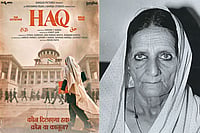Kamila Shamsie, author and now feminist, ‘provokes’ in a recent article in The Guardian that 2018 be declared the Year of Publishing Women, that all publishers and authors take a pledge that they will only come out with books written by women that year, to stem the prevailing male chauvinism in the industry. She throws numbers at you (an unusual thing for a woman to throw, as the chauvinist may say) to prove that publishing is totally skewed against female authors and a step of keeping male writers out for a year is needed to correct that. I can’t say how good this proposal is, if it will right a wrong, and when equality is the issue, if this idea somehow has a whiff of a handicap race where the women writers get a couple of laps before the men start.
But I think we should do one better. I propose that all authors, graphic novelists and poets—men, women and transgender—take a year off from writing. That all of them only read during that period. A fallow period is very important in any area, and it should be especially so in a creative field. That’s why almost all religions have a cool-off time: Ramzan, Lent or Navratras. That’s why fishermen don’t go out to the sea during the rains, farmers leave the land untouched between crops, factories have plant shutdowns, students take gap years, professors go on sabbaticals.
Right now, there is just too much writing going on. Even before the sales have just plateaued on the hurriedly-written Fifty Shades trilogy, E.L. James has already announced a new one, this time from the point of view of Christian Grey. Just when you thought J.K. Rowling was done with Harry Potter and were secretly pleased the books under her pseudonym Robert Galbraith were a clunker, she ‘exposes’ her real name and lo and behold, the third Galbraith book is already in stores. The publicity machinery is already getting cranked up for the next Salman Rushdie blockbuster. Even Harper Lee has a second book out. And recent straw polls show every third Swede, Finn or Norwegian male over forty with a drinking problem is writing a crime thriller.
Writing is going on at a fast clip in the India chapter as well. Before you have fully absorbed Thomas Piketty’s Capital in the Twenty-first Century, there is Rana Dasgupta’s Capital. The redoubtable Ruskin Bond comes up with a collection almost every week. A.P.J. Abdul Kalam has just come out with Reignited, his 21st book. Ramachandra Guha, at the time of the launch of his latest Gandhi book two years ago, Gandhi Before India, said he had enough new material on the father of the nation for five more books. This when books on Gandhi by himself— The Collected Works of Mohandas K. Gandhi by M.K. Gandhi—is a tidy 99 volumes. Amish’s Shiva Trilogy has barely ended and he has announced the Rama Chandra series. He says he has the plotlines jotted down for at least five more.
Amitav Ghosh, it has been a marvelous voyage, let the Ibis drop anchor now. Arundhati Roy, please don’t rush. Vikram Seth, it’s all right, take your time with The Suitable Girl.
If all authors decide to take a year off, books editors can go out in public places boldly. They won’t have to skulk behind bushes or duck under tables at social gatherings whenever they glance upon an author whose book has landed at the desk for review. No corner is without peril—retired armymen, senior bureaucrats (both retired and serving), yoga gurus, academics, chefs, journalists, doctors, sportspeople, designers, spiritual gurus, historians, politicians, artists, professors, economists, industrialists, stand-up comics, bankers, college kids—are all writing books and want them reviewed. Recently, I was at a nine-year-old’s birthday party, thinking it was safe. Turns out the kid is precocious, has written a graphic Manga novel, a publisher has fallen for it and now needs some serious, timely plugging.
A year off from books will give the publishers a much-needed chance to go through their backlists, reissue some of the gems that are out of print (try getting L.P. Hartley’s The Go Between, or anything by Joseph Brodsky). It will give some time to the marketing department of publishing houses to at least read the blurbs of some of the books they print. Editors and authors can mingle over long boozy lunches about how the plot is developing, and drop some of them if it is not developing. And of course it will give readers the breather they need to finish Outlook’s 100 Books That Can Change Your Life.



























